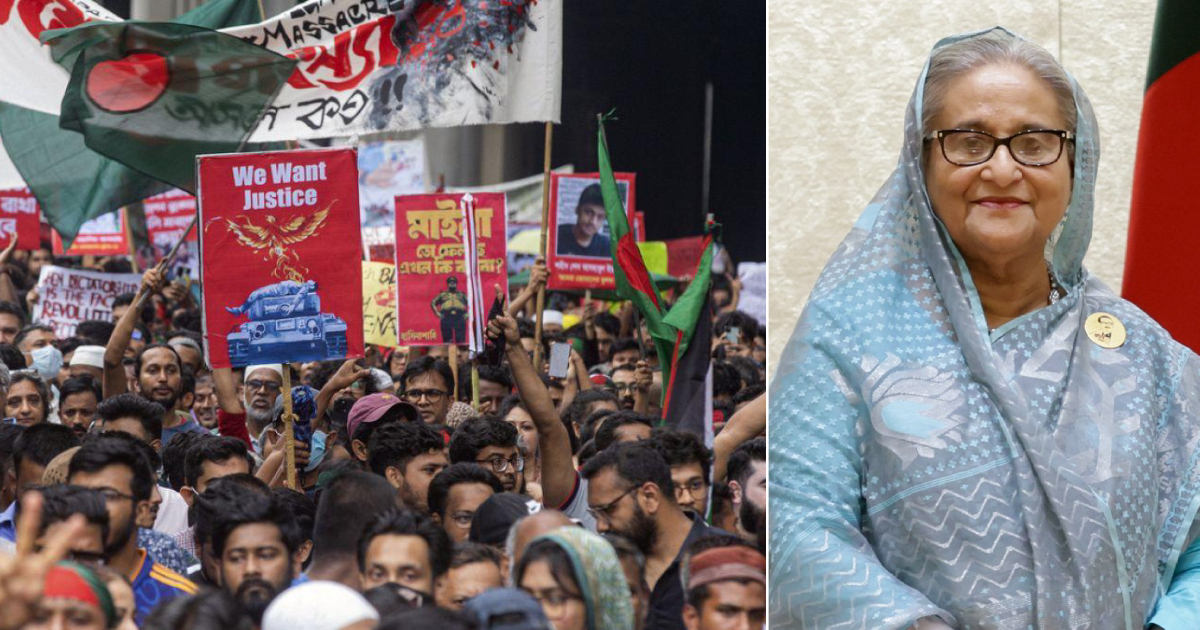
The Prime Minister of Bangladesh, Sheikh Hasina, resigned and fled the country on Monday after weeks of massive protests that escalated into violence, resulting in the deaths of hundreds of people and thousands of demonstrators storming her residence and other buildings associated with her party and family, according to international media reports.
Hasina, 76 years old and in power since January 2009, resigned at noon on Monday (local time) and fled to neighboring India in a military helicopter, reported the BBC.
The resignation of the prime minister occurred as a consequence of the popular uprising that the protests led by young students, which began last July, transformed into, in opposition to a law that established quotas for allocating jobs in the public administration.
The protests continued even after the Supreme Court ruled last month that the quota system—which reserved up to 30% of public jobs for relatives of veterans who fought in the country's independence war against Pakistan—should be drastically reduced, reported the U.S. agency AP.
The police and paramilitary forces violently repressed the protests, which have left nearly 300 dead since mid-July, of which at least 95 - including 14 police officers - were recorded just this Sunday in clashes in the capital Dhaka, AP reported, citing the country's leading Bengali newspaper Prothom Alo.
Furthermore, hundreds of people have been injured and around 11,000 have been detained in recent weeks.
However, the departure of the female leader from power could generate more instability in the Asian country, predominantly Muslim and with 170 million inhabitants, which was already struggling with a crisis that includes high unemployment rates, corruption, and climate change.
Hundreds of thousands of people took to the streets with flags and cheering to celebrate Hasina's resignation, but in some places, the joy gave way to violent acts, with citizens attacking symbols of her government and party, looting, and setting buildings on fire.
"This is not just the end of the tyrant Sheikh Hasina; with this, we put an end to the mafia state that she has created," declared student Sairaj Salekin to AP, who was protesting in the streets of Dhaka.
Multitudes of people stormed the official residence of Hasina, setting fires, looting furniture and other belongings, and taking food from the refrigerators. Hundreds gathered in front of the Parliament building, where they hung a banner that read "justice."
In a televised speech to the nation, the army commander, General Waker-uz-Zaman, announced that he would take control temporarily and would seek advice from President Mohammed Shahabuddin to form an "interim government."
In the evening, following a meeting with the military chief and opposition politicians, President Shahabuddin announced that the Parliament would be dissolved and a national government would be formed as soon as possible, leading to new elections.
In statements to the BBC, the son of the former prime minister and one of her advisors, Sajeeb Wazed Joy, assured that Hasina will definitely retire from politics and defended her legacy.
"She is very disappointed that, after all her hard work, a minority rises against her," she stated. "When she took power, this country was considered a failed state. It was a poor country and even today it is regarded as one of the rising tigers of Asia."
Hasina was re-elected in January for a fourth consecutive term in an election that was boycotted by her main opponents. Thousands of opposition members were imprisoned before the elections. The United States and the United Kingdom deemed the outcome not credible, despite the government's defenses.
Bangladesh's relations with the U.S. and other Western countries have been under strain, as they have expressed concern about human rights violations and press freedom in the Asian nation.
Hasina's political rivals had accused her in the past of becoming increasingly autocratic and threatening the country's democracy.
What do you think?
COMMENTArchived in:
